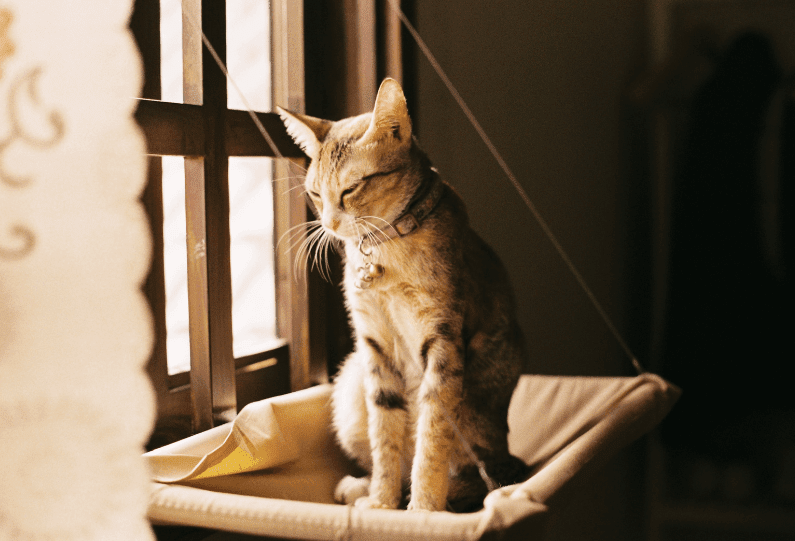Cats have amazing survival instincts and are good at hiding pain and suffering. This can make it very hard to know when they aren’t feeling well. For many possible health issues, including liver problems, it is important to know the signs that something may be wrong to best help your cat.
The liver is very important for your cat's health. It helps with digestion, cleaning out bad things from their body, breaking down food, and making proteins that help blood to clot. When the liver has problems, it can make your cat feel sick and not as happy. It's tough to watch your pet in pain and not wanting to play.
Knowing the signs of liver problems in cats, possible causes, as well as how to treat and prevent liver problems in cats will help you to love your cat well by keeping their liver healthy.
Table of Contents
Symptoms of Liver Problems in cats
It can be hard to see the signs of liver problems in cats when they start because cats are so good at hiding pain. There are a few signs and symptoms to show that your cat is having liver issues. These signs may be different depending on what caused the liver problem and how bad it is. It's important to be alert and notice changes in your cat's behavior, appetite, weight, litter box habits, and their physical appearance for all possible health issues.
These are some common signs of liver problems in cats:
- Loss of appetite
- Yellowing of the eyes, gums, or skin
- Weight loss Vomiting or diarrhea
- Tiredness or weakness
- Being more thirsty
- Changes in litter box habits
- Mood changes
What are Different Liver Diseases Cats may Have?
Liver problems in cats have various causes, such as infections, toxins, genetics, medications, and other health conditions.
There are different types of liver diseases in cats:
- Feline Hepatic Lipidosis (Fatty Liver Disease): This condition when too much fat builds up in the liver, causing liver failure in cats. The main symptoms of this liver problem is when the cat has suddenly lost weight or stopped eating.
- Hepatitis: It refers to the inflammation of the liver, which can result from infections, toxins, or immune system issues. The severity and prognosis depend on the underlying cause and how much the liver has been damaged.
- Cholangitis: is when the tubes that carry bile in the body get swollen. It can make bile flow slow down and make the liver not work well. Infections, inflammation, or things that block the tubes may cause cholangitis in cats.
- Cirrhosis: This is a progressive condition characterized by the replacement of healthy liver tissue with scar tissue. It may result from chronic liver diseases and can affect liver function over time, causing further damage.
How to Know if Your Cat has a Liver Problem
Each of these different liver problems in cat has its own specific symptoms, causes, and treatment ways. To try to know the cause and progression of the liver disease, a veterinarian could check them out and have other tests like bloodwork, scans, or a liver biopsy done.
Blood tests help check liver function, look for elevated liver enzymes, blood clotting factors, and look for signs of inflammation or infection.
Imaging tests like X-rays and ultrasounds show the liver's size and shape, and if there are any other visible concerns.
A liver biopsy is when a small piece of liver tissue is taken to be looked at under a microscope. It helps identify the specific liver disease, know how severe the liver damage is, and help make treatment decisions.
The plan to help treat the cat will depend on the underlying cause, the liver damage, and the cat's overall health.
Are There Ways to Keep the Liver Healthy?
Practicing healthy habits for your kitty is always important and it may also help to prevent liver problems in your cat and reduce the risk of liver disease.
Here are some ways to keep the liver healthy and help it to heal if damaged:
- Be sure your cat is eating healthy foods that give them everything their body naturally needs. Don’t let them have a lot of fatty or processed foods that make the liver work too hard.
- Avoid medications and toxins. Some medicines like painkillers and flea treatments are harmful to the liver. Keep household toxins away from your cat's reach.
- Cleaning products and some plants are very harmful. Also check to be sure if they are eating any human foods that they are safe.
- Keep your home stress-free for your cat. A calm and secure space is needed so they can thrive and stay healthy.
- Chubby kitties are adorable, but this may lead to many health problems, including liver problems in cats. Keep your cat at a healthy weight and maintain it by ensuring their nutrition requirements are met and they are getting enough exercise. Read more on How to Get Your Lazy Cat into Tip-Top Shape!
Treatment and Prognosis of Liver Problems in Cats
Recovery from liver issues depends on the cause, how much damage has been done to the liver, and how quickly the treatment began. Your cat could recover and lead a normal life with the right treatment and possible lifestyle changes.
Eating Habits: Be sure your cat is fed with a diet that is easy to digest, full of the nutrients they need.
Try our BestLife4Pets Hepatic Liver Support for Cats which supports your cat's liver and kidneys, helping them to work well, and helps with healing after liver issues. The ingredients help the liver to stay healthy and work well. They help with creating new liver cells and keep the right number of liver enzymes. Our remedy helps the cat’s liver to remove toxins, keep it from harm, and heal damage from poisons, diseases, or infections. It helps to control glucose levels, make bile flow better. It helps with digestion and metabolism of fat. It provides relief from liver-related discomfort. The remedy helps the liver’s natural processes for filtering and getting rid of toxins.
Depending on the cause and how damaged the liver is, the cat may need lifelong liver care. Long term prognosis depends on many different things, especially the cat’s overall health, including any other health issues.
For more severe cases of liver disease, a trusted veterinarian may suggest medicine or help with fluids if your kitty is dehydrated.
Many cats do quite well when they find an effective treatment, and their parents care for and manage the liver well. It’s good to know about liver problems in cats to be sure to spot any issue early and know how to best care for and support your cat.
Taking the time to be sure you have your cat eating a liver friendly diet and a safe environment to support their health is the best way to keep their liver healthy.
If your cat is in an urgent situation, not wanting to eat or lethargic, or otherwise seeming very unwell, please take them to a trusted veterinarian. We love pets and helping to keep them healthy, please go to BestLife4Pets.com and check out our all natural remedies, supplements, and health solutions for your pets.



